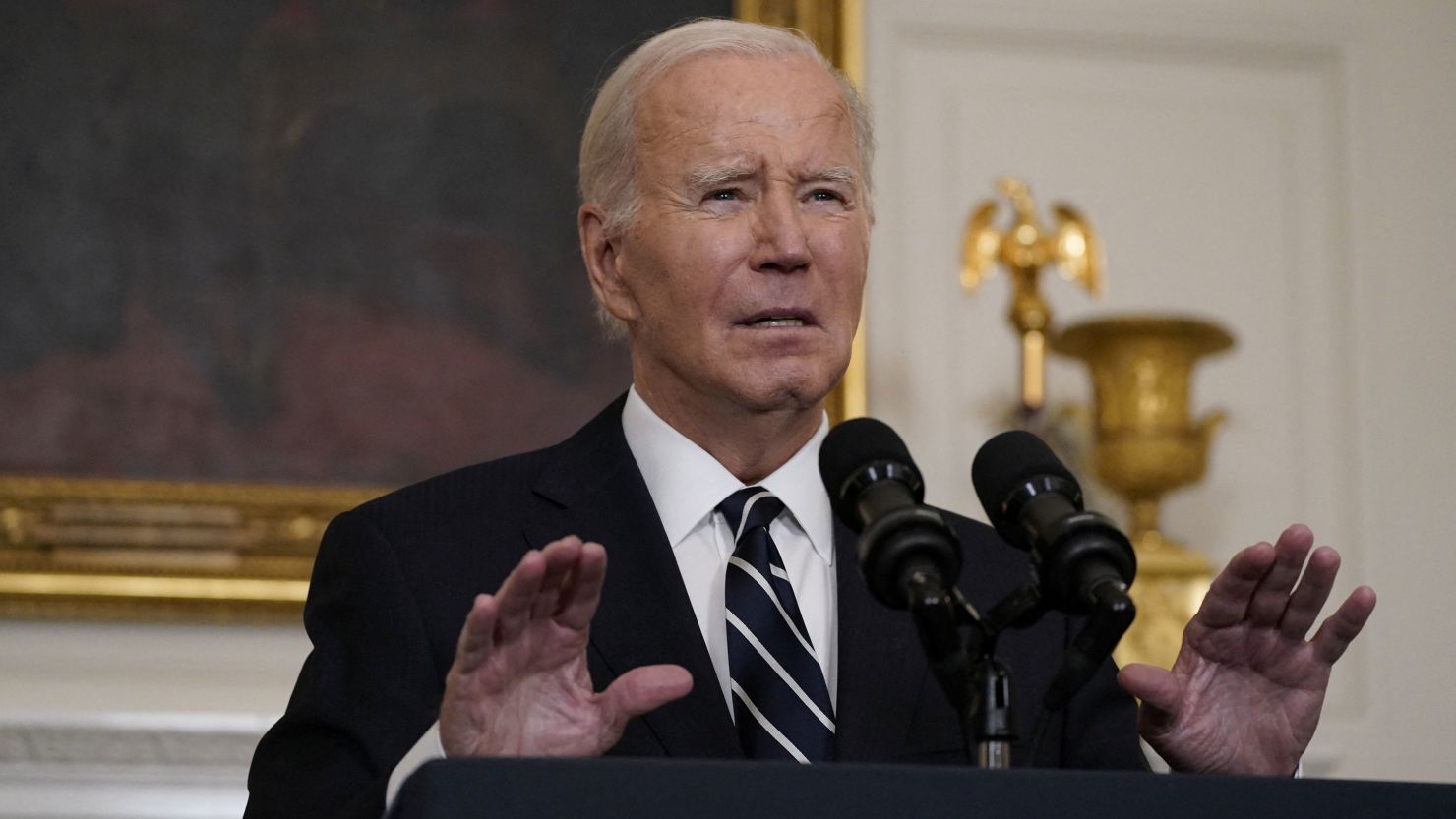A version of this story appears in CNN’s What Matters newsletter. To get it in your inbox, sign up for free here.
The US government is not yet willing to draw a direct line between Iran and the shocking sneak attacks by Hamas militants on Israel outside the Gaza Strip, but President Joe Biden’s domestic political rivals are convinced.
- Former President Donald Trump argued, falsely, that US taxpayer dollars went to Iran and were funneled to Hamas. He also, with characteristic over-the-top rhetoric, argued his administration “brought so much peace to the Middle East.” And during a campaign appearance in New Hampshire, he tried to compare the violent attacks on Israel with the flow of asylum-seeking migrants at the US border with Mexico – although there is clearly no comparison between asylum-seekers and terrorists killing hundreds.
- Sen. Tim Scott, the Republican from South Carolina, told CNN’s Wolf Blitzer Monday night that the Biden administration was “complicit” in the attack on Israel because of the same Iranian funds criticized by Trump.
- Biden’s policies, according to Florida Gov. Ron DeSantis, who was speaking in Iowa, were “very deferential to the Iranians, the Iranians we now know were intimately involved in orchestrating these attacks.”
- Former South Carolina Gov. Nikki Haley, who was US ambassador to the United Nations for part of Trump’s administration, said the US must support Israel to guard against Iran. “Israel is the frontline of defense for the Iranian regime and terrorists that want to hurt us and want to hurt our friends,” Haley said, appearing on NBC’s “Meet the Press” on Sunday.
This is a domestic debate about Iran that will coincide with what could be a protracted war between Israel and Hamas.
Why did Trump say taxpayer dollars went to Iran?
Most of what Trump said is false. US taxpayer dollars did not go to Iran.
However, the Biden administration negotiated for the release in September of five Americans who had been held by Tehran. What bought their freedom was the release of $6 billion in Iranian funds – proceeds from the sale of its oil held in restricted South Korean accounts – frozen by international sanctions on Iran. Read more on the prisoner deal from CNN’s Nadeen Ebrahim.
The deal stipulated that the money would have to be used for humanitarian purposes and that Qatar, which helped broker the deal, would hold the money rather than having it go straight to Iran.
$6 billion could have freed up money elsewhere
Critics, like Haley, have argued that if Iran got $6 billion for humanitarian purposes, that frees up money elsewhere.
“They go and spread terrorism every time they get one dollar,” Haley said. “It doesn’t go to the Iranian people. It does go to terrorist attacks.”
The arguments are similar when it comes to the deal between Iran and Western countries regarding Iran’s nuclear program.
That deal, engineered by former President Barack Obama and Biden during his time as vice president, was subsequently scuttled by Trump. But it was never to send US taxpayer money to Iran; rather, it was to lift some sanctions on Iran in exchange for controls on Iran’s nuclear program.
Was Iran involved in the Hamas attacks?
Iran has both commended the operation by Hamas and denied involvement, according to a report by Ebrahim.
The US has not directly linked Iran to the attacks, but it does view Iran as “broadly complicit,” according to deputy national security adviser Jon Finer, appearing Monday on ABC’s “Good Morning America.”
Iran has given large amounts of support to Hamas, the group that controls Gaza and that the US and Western countries have labeled as a terror organization.
Why would Iran have an interest in war between Hamas and Israel?
CNN’s national security analyst Peter Bergen effectively connects the dots, arguing Iran and Hamas have an interest in stopping a move toward normal relations between Israel and Arab nations.
“There appears also to be a larger play going on here,” Bergen writes for CNN Opinion. “An attempt to end the rapprochement between Israel and the Arab states that began in earnest during the Trump Administration with the Abraham Accords.”
What were the Abraham Accords?
This was the historic deal spearheaded by Trump’s son-in-law Jared Kushner during the Trump administration, under which Arab nations including Bahrain, the United Arab Emirates, Morocco and Sudan recognized Israeli sovereignty.
Palestinian leaders, Bergen notes, opposed the Abraham Accords because it divorced their cause – the creation of a Palestinian state – from broader recognition of Israel in the Arab world.
How Biden has continued Trump’s Israel policy
The Biden administration has tried to capitalize on momentum from Trump’s success with the Abraham Accords to negotiate a deal between Israel and Saudi Arabia.
An active war between Hamas and Israel will seriously complicate that effort.
“I believe if Iran didn’t stimulate or encourage it, it sure understands it is a huge beneficiary of it,” The New York Times columnist Thomas Friedman told CNN’s Fareed Zakaria on Sunday. “The last thing Iran wants was a US-Saudi-Israel strategic alliance to counterbalance Iran. Right now, that’s no longer possible.”
A split in the GOP too
While most of the Republican presidential candidates focused on Biden with their criticisms, former Vice President Mike Pence argued this is a wake-up call for Republicans like Trump who have been moving the party toward a more isolationist worldview – not only with regard to Israel, but also to Ukraine.
“That’s the debate here,” Pence said Sunday on CNN. “Whether we’re going to shrink from our role as leader of the free world, or whether we’re going to lean in in this moment in Israel, and also in eastern Europe. … We’re going to stand strong with our allies and stand up to our enemies.”

